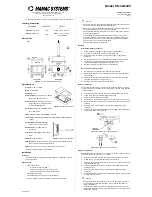
4
Setting into Operation
4.1 Power supply
1) Remove the belt clip (5): Press together the
securing lugs on the left and on the right and
push the clip downwards to remove it (see fig-
ure 2).
2) To insert the batteries, slide down the cover (6)
to open the battery compartment. Insert two
1.5 V batteries of size AA into the compartment
(9) with the positive and negative poles as indi-
cated.
3) Replace the cover.
4.2 Connection and attachment
Connect the plug of the tie clip microphone (14) or
the plug of the headband microphone (13) to the
3.5 mm jack (1) of the pocket transmitter. The DC
voltage required by the microphone is available at
this jack. The connector is provided with a locking
mechanism to prevent accidental disconnection.
Connect the plug to the jack and turn the cap nut
clockwise to secure the plug.
Attach the tie clip microphone (11) with its clip
(12) [e. g. to your clothes] so that it is close to your
mouth.
Put on the headband microphone according to
figure 4. Place the microphone cartridge (10)
close to your mouth in a good position for talking.
The microphone arm will bend in any direction.
Use the belt clip (5) to attach the pocket trans-
mitter to your clothes. After inserting the batteries
(
chapter 4.1) slide the clip from the bottom into
the support until it engages.
5
Operation
1) Before initial operation, turn back both volume
controls on the receiver to “1”.
2) Switch on the receiver.
3) Switch on the pocket transmitter: Set the switch
(2) to the left stop (position ON): The LED (3)
lights up during operation. If it fails to light up or
if it starts flashing, the batteries may be low and
should be replaced.
After switching on the transmitter, a wireless
connection to the receiver is made. An LED on
the receiver will indicate successful connection
to the corresponding transmitter.
Before operating the transmitter together
with a receiver for the first time, match the two
units (
chapter 5.1). If the LED fails to light
up or starts flickering although matching has
been successful and the transmitter has been
switched on, another transmitter may cause
interference in transmission. In this case,
change the transmission channel of the trans-
mitter (
chapter 5.2).
If there is still interference in transmission,
please check
– if the batteries of the transmitter are low.
– if there are objects or other wireless trans-
mitters (e. g. microwaves, WLAN, baby
monitors) in the transmission path which
may interfere with reception. Metal objects
in the vicinity of the transmitter or receiver
may affect the directivity of the antenna.
– if the reception can be improved when you
turn the antennas.
– if the distance between the transmitter and
the receiver is too long (range: approx. 20 m).
4) Speak into the microphone. Adjust the desired
volume with the corresponding VOLUME con-
trol on the receiver. Turn up the volume control
(4) on the transmitter without distorting the
sound.
5) To briefly mute the microphone, set the switch
(2) to mid-position (ST.BY).
6) To switch off the transmitter, set the switch to
the right stop (position OFF). If nobody speaks
into the microphone for more than five minutes
or if the microphone is muted for this period of
Never put used batteries or defective
rechargeable batteries in the household
waste; always take them to a special
waste disposal, e. g. collection container
at your retailer.
GB
8








































